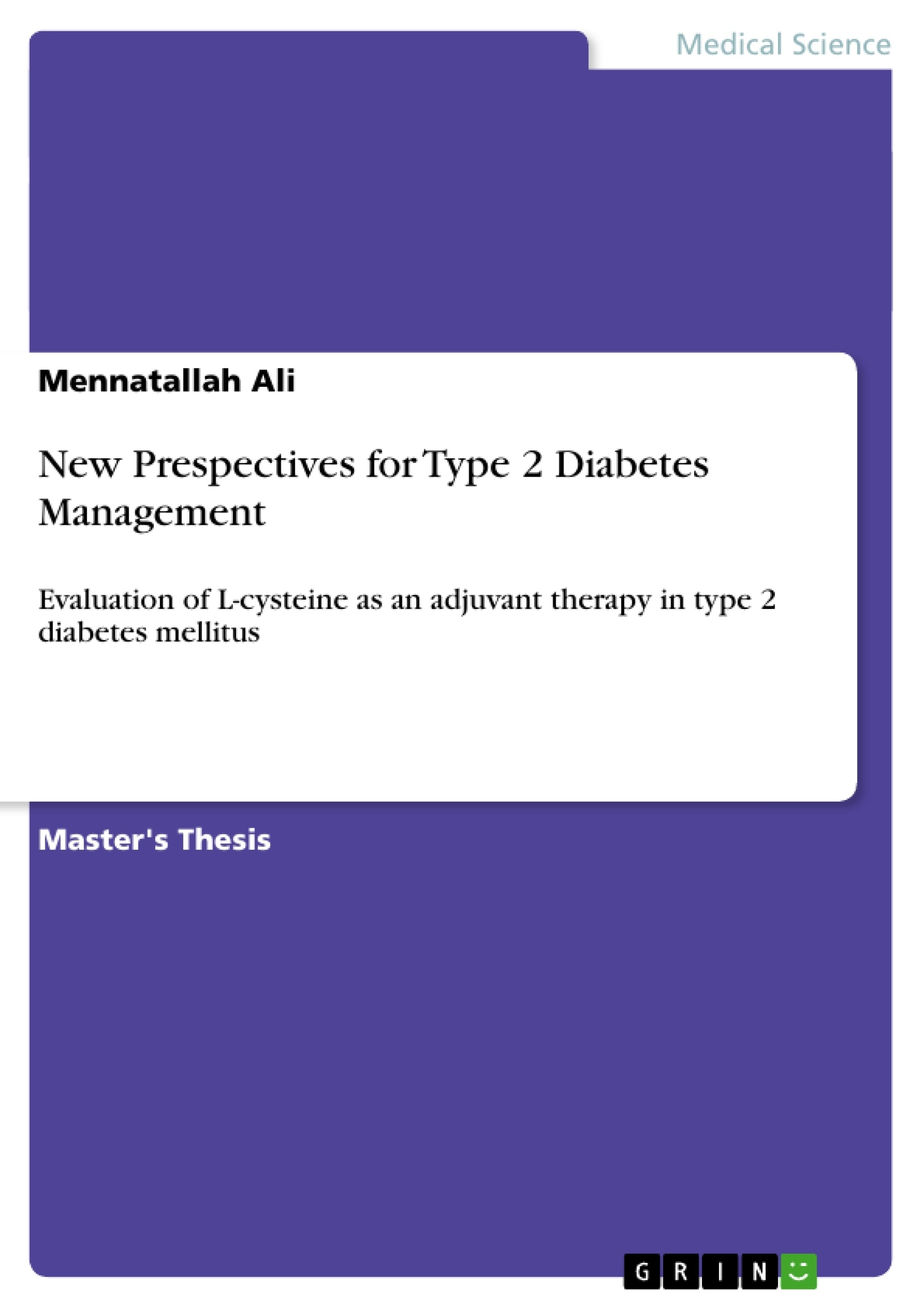Increasing evidence has established causative links between obesity, chronic inflammation and insulin resistance; the core pathophysiological feature in type 2 diabetes mellitus. This study was designed to examine whether the combination of L-cysteine and metformin would provide additional benefits in reducing oxidative stress, inflammation and insulin resistance in streptozotocin-induced type 2 diabetes in rats. Male Wistar rats were fed a high-fat diet (HFD) for 8 weeks to induce insulin resistance, after which they were rendered diabetic with low-dose streptozotocin. Diabetic rats were treated with metformin (300 mg/kg/day), L-cysteine (300 mg/kg/day) and their combination along with HFD for another 2 weeks. Control rats were fed normal rat chow throughout the experiment. At the end of treatment, fasting blood glucose, fasting serum insulin, homeostasis model assessment–insulin resistance index (HOMA-IR) and serum free fatty acids (FFAs) were measured. Serum levels of the inflammatory markers; monocyte chemoattractant protein-1 (MCP-1), C-reactive protein (CRP) and nitrite/nitrate were also determined. The liver was isolated and used for determination of malondialdehyde (MDA), reduced glutathione (GSH), caspase-3 and cytochrome c levels. The hypoglycemic effect of the combination therapy exceeded that of metformin and L-cysteine monotherapies with more improvement in insulin resistance. All treated groups exhibited significant reductions in serum FFAs, oxidative stress and inflammatory parameters, caspase-3 and cytochrome c levels compared to untreated diabetic rats with the highest improvement observed in the combination group. In conclusion, the present results clearly suggest that L-cysteine can be strongly considered as an adjunct to metformin in management of type 2 diabetes.
Inhaltsverzeichnis (Table of Contents)
- AIM OF THE WORK
- MATERIALS AND METHODS
- RESULTS
- DISCUSSION
- CONCLUSIONS AND RECOMMENDATIONS
- SUMMARY
Zielsetzung und Themenschwerpunkte (Objectives and Key Themes)
This work aims to investigate the effects of various drugs on type 2 diabetes and its related complications in male albino rats. The study focuses on assessing the efficacy of these drugs in managing hyperglycemia, improving lipid profiles, reducing oxidative stress, and mitigating inflammatory responses.
- The impact of type 2 diabetes on metabolic parameters, including blood glucose levels, insulin sensitivity, and lipid profiles.
- The role of oxidative stress in the pathogenesis of diabetes-related complications.
- The effectiveness of different drugs in managing hyperglycemia, dyslipidemia, and oxidative stress in diabetic rats.
- The potential anti-inflammatory properties of the studied drugs.
Zusammenfassung der Kapitel (Chapter Summaries)
The first chapter lays out the objectives of the study, focusing on investigating the impact of specific drugs on type 2 diabetes and its associated complications in male albino rats. It delves into the rationale for using these drugs and the expected outcomes.
The second chapter details the materials and methods used in the study, outlining the experimental design, animal models, drug administration, and the various parameters measured to evaluate the drugs' effects.
The third chapter presents the results obtained from the study, including the effects of type 2 diabetes on different metabolic parameters, lipid profiles, oxidative stress markers, and inflammatory mediators.
The fourth chapter discusses the findings of the study, interpreting the results in relation to previous research and existing knowledge on type 2 diabetes and its management. It explores the mechanisms by which the studied drugs exert their effects and highlights the significance of the results.
Schlüsselwörter (Keywords)
Type 2 Diabetes, Oxidative Stress, Inflammation, Lipid Profile, Hyperglycemia, Antidiabetic Drugs, Male Albino Rats, Experimental Study.
Frequently Asked Questions
How can L-cysteine benefit Type 2 Diabetes management?
L-cysteine acts as an adjunct to metformin, helping to reduce oxidative stress, inflammation, and insulin resistance more effectively than monotherapy.
What was the result of combining metformin and L-cysteine?
The combination therapy showed a superior hypoglycemic effect and significant improvements in insulin sensitivity compared to using either drug alone.
What role does oxidative stress play in diabetes?
Oxidative stress is a core feature of diabetes pathogenesis, contributing to chronic inflammation and the development of long-term complications.
What inflammatory markers were measured in the study?
The study monitored markers such as C-reactive protein (CRP), monocyte chemoattractant protein-1 (MCP-1), and nitrite/nitrate levels.
How was the study conducted?
Researchers used streptozotocin-induced diabetic male Wistar rats fed on a high-fat diet to test the efficacy of the drug combination over a 10-week period.
- Quote paper
- Mennatallah Ali (Author), 2012, New Prespectives for Type 2 Diabetes Management, Munich, GRIN Verlag, https://www.grin.com/document/272379



